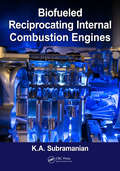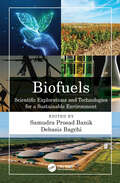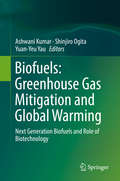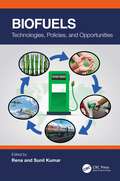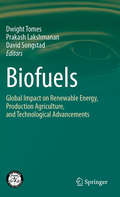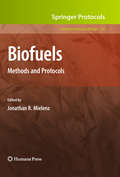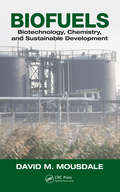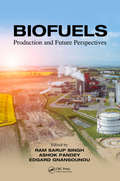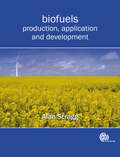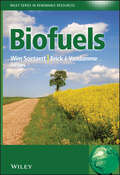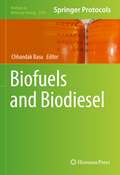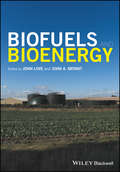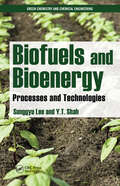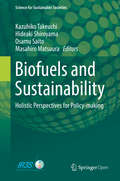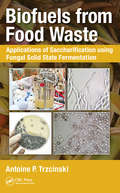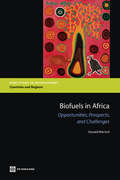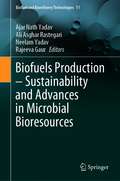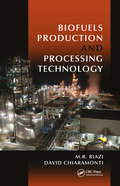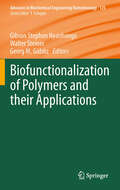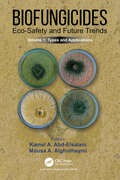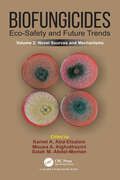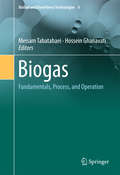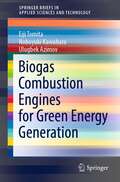- Table View
- List View
Biofueled Reciprocating Internal Combustion Engines
by K. A. SubramanianBiofuels such as ethanol, butanol, and biodiesel have more desirable physico-chemical properties than base petroleum fuels (diesel and gasoline), making them more suitable for use in internal combustion engines. The book begins with a comprehensive review of biofuels and their utilization processes and culminates in an analysis of biofuel quality and impact on engine performance and emissions characteristics, while discussing relevant engine types, combustion aspects and effect on greenhouse gases. It will facilitate scattered information on biofuels and its utilization has to be integrated as a single information source. The information provided in this book would help readers to update their basic knowledge in the area of "biofuels and its utilization in internal combustion engines and its impact Environment and Ecology". It will serve as a reference source for UG/PG/Ph.D. Doctoral Scholars for their projects / research works and can provide valuable information to Researchers from Academic Universities and Industries. Key Features: • Compiles exhaustive information of biofuels and their utilization in internal combustion engines. • Explains engine performance of biofuels • Studies impact of biofuels on greenhouse gases and ecology highlighting integrated bio-energy system. • Discusses fuel quality of different biofuels and their suitability for internal combustion engines. • Details effects of biofuels on combustion and emissions characteristics.
Biofuels: Scientific Explorations and Technologies for a Sustainable Environment
by Samudra Prosad Banik Debasis BagchiBiofuels are promising eco-friendly, renewable energy alternatives, simultaneously curbing the dependence on depleting fossil fuel reserves, reducing the global carbon footprint. However, there have been technological constraints deterring the global wide-scale adoption of biofuel. Biofuels: Scientific Explorations and Technologies for a Sustainable Environment presents a comprehensive analysis of different types of biofuels. Five sections provide detailed information on the history and discovery of biofuels, first-generation biofuels, second-generation biofuels, third-generation biofuels, and beyond, as well as prospects of biofuels as cleaner and greener alternatives.FEATURES Introduces the history of the origin of biofuels Narrates the evolution of biofuel raw material beyond generations, from food crops to plastic waste Explains the application of primary biofuel types: biodiesel, bioethanol, and biohydrogen Discusses the promises and prospects of biofuel for a cleaner, sustainable future Biofuels: Scientific Explorations and Technologies for a Sustainable Environment analyzes the promising future of biofuel technology and its judicious use to minimize dependency on fossil fuels. It is designed for academia, scientists, and researchers, as well as industrialists, environmentalists, biofuel technicians, R&D industries, and those from the petroleum industry.
Biofuels: Greenhouse Gas Mitigation and Global Warming
by Ashwani Kumar Shinjiro Ogita Yuan-Yeu YauThis timely book is a compilation of edited articles by distinguished international scientists discussing global warming, its causes as well as present and future solutions. Social and economic growth at global level is measured in terms of GDP, which requires energy inputs generally based on fossil fuel resources. These, however, are major contributors to increasing levels of CO2, causing 15 tonnes of green house gas emissions per capita. Renewable sources of energy offer an alternative to fossil fuels, and would help reduce this to the 2 tonnes of greenhouse gas emissions per capita per annum needed to achieve sustainable growth. As such, the book discusses the next-generation of biofuels and all related aspects, based on the editors’ significant investigations on biofuels over the last 30 years. It also presents the latest research findings from research work carried out by contemporary researchers. Presenting global biofuel perspectives, it examines various issues related to sustainable development of biofuels in the contexts of agriculture, forestry, industry and economic growth. It covers the 1st to 4th generation biofuels, as well as the status of biofuel resources and their potential in carbon neutral economy. Offering a comprehensive, state-of-art overview of current and future biofuels at local and global levels, this book appeals to administrators, policy makers, universities and research institutions.
Biofuels: Technologies, Policies, and Opportunities
by Sunil Kumar RenaOffering a comprehensive overview of biofuels and bioenergy systems, Biofuels: Technologies, Policies, and Opportunities describes advances in technologies and global policies around biofuels as a renewable energy source. It discusses the basics of biofuel and bioenergy systems and current status and potential challenges in developed and developing countries. The book also highlights the questions that should be asked, available options, and processes (conventional and advanced) to enhance biofuel production. Details how technological interventions can influence the operation of an effective bioenergy system. Presents information regarding renewable energy directives and global policies related to energy chains, energy models, market status, and appropriateness of technology selection for different generations of biofuel generation. Covers socio-economic aspects and techno-economic feasibility as well as a detailed life cycle simulations (LCS) approach, revealing the real constraints being faced in the biofuels sector. Helps bioenergy professionals to prepare a roadmap for day-to-day operations. Describes recent advances such as biohythane, advanced oxidation process, and nanocatalyzed pretreatment for biofuel generation from wastewater. Addresses the most commonly discussed issues in the biofuel sector and the rationales underpinning them. Written for professionals, academic researchers, decision makers, and policymakers in the biofuel sector, this book provides readers with a wide-ranging review of current research and developments in the respective field.
Biofuels: Global Impact on Renewable Energy, Production Agriculture, and Technological Advancements
by Prakash Lakshmanan Dwight Tomes David SongstadThis comprehensive volume developed under the guidance of guest editors Prakash Lakshmanan and David Songstad features broad coverage of the topic of biofuels and its significance to the economy and to agriculture. These chapters were first published by In Vitro Cellular and Developmental Biology In Vitro Plant in 2009 and consists of 15 chapters from experts who are recognized both for their scientific accomplishments and global perspective in their assigned topics.
Biofuels: Methods and Protocols (Methods in Molecular Biology #581)
by Jonathan R. MielenzWith the dwindling supplies of fossil fuels and growing concerns regarding climate changes due to green house gasses from these fuels, public opinion has swung dramatically towards favoring the development of renewable energy sources. In Biofuels: Methods and Protocols, career-long experts explore a full range of methods for bioenergy covering important topics such as biomass production and delivery to the biorefinery, detailed biochemical characterization, as well as biotechnological techniques for converting plant matter into fuels and chemicals. Time is of the essence in this field, and this volume aims to provide direction and assistance to the growing cadre of researchers endeavoring to develop new sources of bioenergy with a solid, easy-to-use collection of tried-and-true methods which will save time and effort in the field and the laboratory. Written in the highly successful Methods in Molecular BiologyTM series format, chapters include brief introductions to their respective topics, lists of the necessary equipment, materials and reagents, step-by-step, readily reproducible field and laboratory protocols, and notes on troubleshooting and avoiding common pitfalls. Timely and authoritative, Biofuels: Methods and Protocols seeks to help scientists and engineers as they develop and optimize bioenergy technologies needed to drastically change the course of our energy future as soon as possible.
Biofuels: Biotechnology, Chemistry, and Sustainable Development
by David M. MousdaleEvaluating a wealth of quantitative data, Biofuels: Biotechnology, Chemistry, and Sustainable Development discusses different types of biofuels, the science behind their production, the economics of their introduction to the marketplace, their environmental impacts, and their implications for world agriculture. It broadens the discussion on biofuel
Biofuels: Production and Future Perspectives
by RAM SARUP SINGH, ASHOK PANDEY AND EDGARD GNANSOUNOUThis will be a comprehensive multi-contributed reference work, with the Editors being highly regarded alternative fuels experts from India and Switzerland. There will be a strong orientation toward production of biofuels covering such topics as biodiesel from renewable sources, biofuels from biomass, vegetable based feedstocks from biofuel production, global demand for biofuels and economic aspects of biofuel production. Book covers the latest advances in all product areas relative to biofuels. Discusses coverage of public opinion related to biofuels. Chapters will be authored by world class researchers and practitioners in various aspects of biofuels. Provides good comprehensive coverage of biofuels for algae. Presents extensive discussion of future prospects in biofuels.
Biofuels
by Alan ScraggProviding the world's growing population with its increasing demands for energy is a major challenge for science, business and society alike. Energy can be generated from many sources, but not all sources are suitable for every application. Much of today's technology has been built on solid, liquid and gaseous fuels derived from fossil sources. However, the supply of these is finite and their combustion produces carbon dioxide, one of the gases responsible for global warming. Therefore, alternative sources of energy are required which are renewable, sustainable and carbon neutral. This textbook explores the production of biofuels as alternatives to fossil fuels, focusing on the technological issues that need to be addressed for any new fuel source. Each type of biofuel currently in production is considered in detail, covering the benefits and problems with production and use and the potential for biological material to provide sufficient energy for the world's population - the principles on which future fuel development are based.
Biofuels
by Erik Vandamme Wim SoetaertThis book gives a broad overview of the key topics in this field of study, approaching them from a technical and economic angle giving the reader a comprehensive insight into biofuels as a whole. Dealing specifically with liquid and gaseous biofuels that can be produced from renewable resources this text also gives a summary of the past, present and future production technologies and applications of biofuels. This book is particularly relevant as it highlights the extensive debate of the on-going global needs to find alternative fuels, making it not only a necessary text for working professionals and researchers in the field, but for anyone with an interest in sustaining the earth.
Biofuels and Biodiesel (Methods in Molecular Biology #2290)
by Chhandak BasuThis volume provides methods and protocols on principle, production, molecular aspects, and sustainability of biofuel and biodiesel. Chapters are divided into four sections detailing biofuel production, biodiesel production, molecular genetics, biotechnology of biofuel and biodiesel production, economics, and sustainability of biofuel production. Written in the highly successful Methods in Molecular Biology series format, chapters include introductions to their respective topics, lists of the necessary materials and reagents, step-by-step, readily reproducible laboratory protocols, and tips on troubleshooting and avoiding known pitfalls. Authoritative and cutting-edge, Biofuels and Biodiesel aims to be useful for researchers, students, and enthusiasts in the field of biofuel and biodiesel.
Biofuels and Bioenergy
by John A. Bryant John LoveWith increased public and scientific attention driven by factors such as oil price spikes, the need for increased energy security, and concerns over greenhouse gas emissions from fossil fuels, the production of fuels by biological systems is becoming increasingly important as the world seeks to move towards renewable, sustainable energy sources. Biofuels and Bioenergy presents a broad, wide-ranging and informative treatment of biofuels. The book covers historical, economic, industrial, sociological and ecological/environmental perspectives as well as dealing with all the major scientific issues associated with this important topic.With contributions from a range of leading experts covering key aspects, including: • Conventional biofuels.• Basic biology, biochemistry and chemistry of different types and classes of biofuel.• Current research in synthetic biology and GM in the development and exploitation of new biofuel sources.• Aspects relating to ecology and land use, including the fuel v food dilemma.• Sustainability of different types of biofuel.• Ethical aspects of biofuel production. Biofuels and Bioenergy provides students and researchers in biology, chemistry, biochemistry and chemical engineering with an accessible review of this increasingly important subject.
Biofuels and Bioenergy: Processes and Technologies (Green Chemistry and Chemical Engineering)
by Sunggyu Lee Y.T. ShahThe newest addition to the Green Chemistry and Chemical Engineering series from CRC Press, Biofuels and Bioenergy: Processes and Technologies provides a succinct but in-depth introduction to methods of development and use of biofuels and bioenergy. The book illustrates their great appeal as tools for solving the economic and environmental challenge
Biofuels and Bioenergy
by John Love John A. BryantWith increased public and scientific attention driven by factors such as oil price spikes, the need for increased energy security, and concerns over greenhouse gas emissions from fossil fuels, the production of fuels by biological systems is becoming increasingly important as the world seeks to move towards renewable, sustainable energy sources. Biofuels and Bioenergy presents a broad, wide-ranging and informative treatment of biofuels. The book covers historical, economic, industrial, sociological and ecological/environmental perspectives as well as dealing with all the major scientific issues associated with this important topic.With contributions from a range of leading experts covering key aspects, including: • Conventional biofuels.• Basic biology, biochemistry and chemistry of different types and classes of biofuel.• Current research in synthetic biology and GM in the development and exploitation of new biofuel sources.• Aspects relating to ecology and land use, including the fuel v food dilemma.• Sustainability of different types of biofuel.• Ethical aspects of biofuel production. Biofuels and Bioenergy provides students and researchers in biology, chemistry, biochemistry and chemical engineering with an accessible review of this increasingly important subject.
Biofuels and Sustainability: Holistic Perspectives for Policy-making (Science for Sustainable Societies)
by Hideaki Shiroyama Osamu Saito Kazuhiko Takeuchi Masahiro MatsuuraThis open access book presents a comprehensive analysis of biofuel use strategies from an interdisciplinary perspective using sustainability science. This interdisciplinary perspective (social science-natural science) means that the strategies and policy options proposed will have significant impacts on the economy and society alike. Biofuels are expected to contribute to reducing greenhouse gas emissions, revitalizing economies in agricultural communities and alleviating poverty. However, despite these anticipated benefits, international organizations such as the FAO, OECD and UN have published reports expressing concerns that biofuel promotion may lead to deforestation, water pollution and water shortages. The impacts of biofuel use are extensive, cross-sectoral and complex, and as such, comprehensive analyses are required in order to assess the extent to which biofuels can contribute to sustainable societies. Applying interdisciplinary sustainability science concepts and methodologies, the book helps to enhance the establishment of a sustainable society as well as the development of appropriate responses to a global need for urgent action on current issues related to biofuels.
Biofuels from Algae: Methods and Protocols (Methods in Molecular Biology #1980)
by Kristian SpillingThis volume provides a comprehensive overview of different ways to grow algae and the techniques used to start algal cultivation, monitor algal growth, environmental impact of growing algae, and various methods for characterizing the biomass. The chapters in this book discuss a range of topics such as step-by-step protocols on how to isolate and grow algae; descriptions on how to use fluorescence to estimate algal biomass and lipid content; and instructions on using advanced techniques to determine the carbohydrates and lipids in algal biomass. Written in the highly successful Methods in Molecular Biology series format, chapters include introductions to their respective topics, lists of the necessary materials and reagents, step-by-step, readily reproducible laboratory protocols, and tips on troubleshooting and avoiding known pitfalls.Authoritative and cutting-edge, Biofuels from Algae: Methods and Protocols is a valuable resource for novice and experienced researchers who want to learn more about this impactful and developing field.
Biofuels from Food Waste: Applications of Saccharification using Fungal Solid State Fermentation
by Antoine Prandota TrzcinskiAccording to the UN's Food & Agricultural Organization (FAO), one third of food produced globally for human consumption (nearly 1.3 billion tons) is lost annually. Food waste has often been incinerated with other combustible municipal wastes for possible recovery of heat or other forms of energy, however, incineration is not cost-effective, and can cause air pollution. Due to its organics- and nutrient-rich nature, food waste could be viewed as a useful resource for production of high-value platform chemicals through fermentation. This book examines the bioconversion of food wastes to energy and the recent developments in ethanol, hydrogen, methane, and biodiesel production from food wastes.
Biofuels in Africa
by Donald Mitchell DonaldA new economic opportunity for sub-Saharan Africa is looming large: biofuel production. Rapidly rising energy prices are expected to remain high for an extended period of time because of the increasing demand in prospering and populous countries such as China and India, the depletion of easily accessible supplies of crude oil, and concern over global climate change. As a result, there is renewed interest in biofuels as an alternative to fossil fuels. Africa is uniquely positioned to produce these new cash crops for both domestic use and export. The region has abundant land resources and preferential access to protected markets with higher-than-world-market prices. The rapid growth in the demand for transport fuels in Africa and high fuel prices create domestic markets for biofuels. The European Union and the United States have approved legislation that requires large increases in the consumption of biofuels over at least the next decade. Imports are expected to be needed to meet these mandates, thus opening the door to African and other developing countries that can produce biofuels or feedstocks for biofuels competitively. Expanding the production of crops for biofuels will affect the entire rural sector in Africa as resources are shifted away from traditional crops and the prices of all agricultural commodities rise. Even smallholders can participate in producing biofuel crops. To promote the sustainability and significant contribution of this enterprise, Biofuels in Africa provides guidance in formulating suitable policy regimes, which are based on protecting the rights of current land users, developing revenue-sharing schemes with local communities, safeguarding the environment and biodiversity, expanding institutional capacity, formulating new regulations and procedures, and emulating best practices from experienced countries. This volume will be of value to anyone interested in biofuels, including policy makers, development practitioners, private investors, researchers, and the general public. Now that African countries are trying to significantly increase their energy supply systems, biofuels are an attractive option using both dedicated crops and agricultural waste. This book provides guidance for them to develop a suitable policy regime for a significant contribution by biofuels. -Professor Ogunlade R. Davidson, Minister of Energy and Water Resources, Sierra Leone Biofuels in Africa is a sorely needed resource for our understanding of the problems of expanding biofuels production in Africa. A high point of the book is a description of the projects that were started in several countries. A very useful book! -Professor José Goldemberg, University of São Paulo, Brazil As Africa most likely will play the same role for global biofuels as the Middle East does for oil, this comprehensive book on African biofuels should be compulsory reading for anyone interested in either African development or biofuels. The book captures the essence of long-term drivers and opportunities as well the complex challenges for investors and society of this huge emerging industry. -Per Carstedt, Executive Chairman, EcoEnergy Africa
Biofuels Production – Sustainability and Advances in Microbial Bioresources (Biofuel and Biorefinery Technologies #11)
by Rajeeva Gaur Ajar Nath Yadav Ali Asghar Rastegari Neelam YadavThis book focuses on the different kinds of biofuels and biofuel resources. Biofuels represent a major type of renewable energy. As part of a larger bio-economy, they are closely linked to agriculture, forestry and manufacturing. Biofuels have the potential to improve regional energy access, reduce dependence on fossil fuels and contribute to climate protection. Further, this alternative form of energy could revitalize the forestry and agricultural sector and promote the increased use of renewable resources as raw materials in a range of industrial processes. Efforts are continuously being made to develop economically competitive biofuels, and microbes play important roles in the production of biofuels from various bioresources. This book elaborates on recent advances in existing microbial technologies and on sustainable approaches to improving biofuel production processes. Additionally, it examines trends in, and the limitations of, existing processes and technologies. The book offers a comprehensive overview of microbial bioresources, microbial technologies, advances in bioconversion and biorefineries, as well as microbial and metabolic engineering for efficient biofuel production. Readers will also learn about the environmental impacts and the influence of climate change on the sustainability of biofuel production. This book is intended for researchers and students whose work involves biorefinery technologies, microbiology, biotechnology, agriculture, environmental biology and related fields.
Biofuels Production and Processing Technology (Fuels and Petrochemicals)
by M. R. Riazi David ChiaramontiThe importance of biofuels in greening the transport sector in the future is unquestionable, given the limited available fossil energy resources, the environmental issues associated to the utilization of fossil fuels, and the increasing attention to security of supply. This comprehensive reference presents the latest technology in all aspects of biofuels production, processing, properties, raw materials, and related economic and environmental aspects. Presenting the application of methods and technology with minimum math and theory, it compiles a wide range of topics not usually covered in one single book. It discusses development of new catalysts, reactors, controllers, simulators, online analyzers, and waste minimization as well as design and operational aspects of processing units and financial and economic aspects. The book rounds out by describing properties, specifications, and quality of various biofuel products and new advances and trends towards future technology.
Biofunctionalization of Polymers and their Applications: Biofunctionalization Of Polymers And Their Applications (Advances in Biochemical Engineering/Biotechnology #125)
by Georg Gübitz Gibson Stephen Nyanhongo Walter SteinerChitin, Chitosan and Derivatives for Wound Healing and Tissue Engineering, by Antonio Francesko and Tzanko Tzanov Polyhydroxyalkanoates (PHA) and their Applications, by Guo-Qiang Chen.- Enzymatic Polymer Functionalisation: Advances in Laccase and Peroxidase Derived Lignocellulose Functional Polymers, by Gibson S. Nyanhongo, Tukayi Kudanga, Endry Nugroho Prasetyo and Georg M. Guebitz.- Lipases in Polymer Chemistry, by Bahar Yeniad, Hemantkumar Naik and Andreas Heise.- Enzymes for the Biofunctionalization of Poly(Ethylene Terephthalate), by Wolfgang Zimmermann and Susan Billig.- Biology of Human Hair: Know Your Hair to Control It, by Rita Araújo, Margarida Fernandes, Artur Cavaco-Paulo and Andreia Gomes.- Recombinamers: Combining Molecular Complexity with Diverse Bioactivities for Advanced Biomedical and Biotechnological Applications, by José Carlos Rodríguez-Cabello, María Pierna, Alicia Fernández-Colino, Carmen García-Arévalo and Francisco Javier Arias.- Biomimetic Materials for Medical Application Through Enzymatic Modification, by Piergiorgio Gentile, Valeria Chiono, Chiara Tonda-Turo, Susanna Sartori and Gianluca Ciardelli.- Supramolecular Polymers Based on Cyclodextrins for Drug and Gene Carrier Delivery, by Jia Jing Li, Feng Zhao and Jun Li.- Engineering Liposomes and Nanoparticles for Biological Targeting, by Rasmus I. Jølck, Lise N. Feldborg, Simon Andersen, S. Moein Moghimi and Thomas L. Andresen.-
Biofungicides: Types and Applications, Volume 1
by Kamel A. Abd-Elsalam Mousa A. AlghuthaymiThe current volume focuses on all the major concerns associated with the biofungicides and provides comprehensive knowledge of microbial and phytochemical fungicides, bioformulations, regulation as well as limitation of biofungicides, and their role in disease management in plants. The use of biofungicides as eco-friendly alternative to traditional synthetic fungicides is likely to play a major role in organic farming in the future.
Biofungicides: Novel Sources and Mechanisms, Volume 2
by Kamel A. Abd-Elsalam Mousa A. Alghuthaymi Salah M. Abdel-MomenThe current volume focuses on novel sources of biofungicides, primarily providing complete knowledge of microbial and phytochemical fungicides, studying antifungal activity mechanisms as well as their role in disease management in plants, and fungicide bioremediation. The use of biofungicides as eco-friendly alternative to typical synthetic fungicides is projected to play a significant role in organic farming in the future.Key Features: Discovers novel sources of biofungicides Describes the role of biofungicides in the control of plant diseases Studies antifungal activity mechanisms Explores how to survey and select promising biofungicides
Biogas: Fundamentals, Process, And Operation (Biofuel and Biorefinery Technologies #6)
by Meisam Tabatabaei Hossein GhanavatiThis book presents the state of the art in biogas production using anaerobic digestion technology, with an emphasis on waste utilization/valorization. Offering a comprehensive reference guide to biogas production from different waste streams, it covers various aspects of anaerobic digestion technology from the basics, i.e., microbiological aspects to prominent parameters governing biogas production systems, as well as major principles of their operation, analysis, process control, and troubleshooting. Written and edited by internationally recognized experts in the field of biogas production from both academia and industry, it provides in-depth and cutting-edge information on central developments in the field. In addition, it discusses and reviews major issues affecting biogas production, including the type of feedstock, pretreatment techniques, production systems, design and fabrication of biogas plants, as well as biogas purification and upgrading technologies. ‘Biogas: Fundamentals, Process, and Operation’ also addresses the application of advanced environmental and energy evaluation tools including life cycle assessment (LCA), exergy, techno-economics, and modeling techniques. This book is intended for all researchers, practitioners and students who are interested in the current trends and future prospects of biogas production technologies.
Biogas Combustion Engines for Green Energy Generation (SpringerBriefs in Applied Sciences and Technology)
by Eiji Tomita Nobuyuki Kawahara Ulugbek AzimovThis book deals with the combustion and exhaust emissions of gas engines fueled with green biogas. Biogas is a mixture of gases, primarily consisting of methane and carbon dioxide. Biogas can be produced from raw materials such as agricultural waste, manure, municipal waste, plant material, sewage, food waste, etc. Biogas is considered to be a renewable source of energy. Therefore, it can contribute to the prevention of global warming.The biogas engine is used to co-generate electricity by operating engine and heat from hot exhaust gases. The energy source used very efficiently. Unlike other green energy sources such as wind and solar, biogas is readily available when needed.This book first describes the basics of biogas and its application to internal combustion engines. Next, it describes the engine system and the combustion phenomena in the engine cylinder. Engine technology continues to advance in spark ignition and dual-fuel engines to achieve higher thermal efficiency and lower harmful emissions. Several advanced combustion technologies are introduced to achieve higher thermal efficiency while avoiding knocking.
